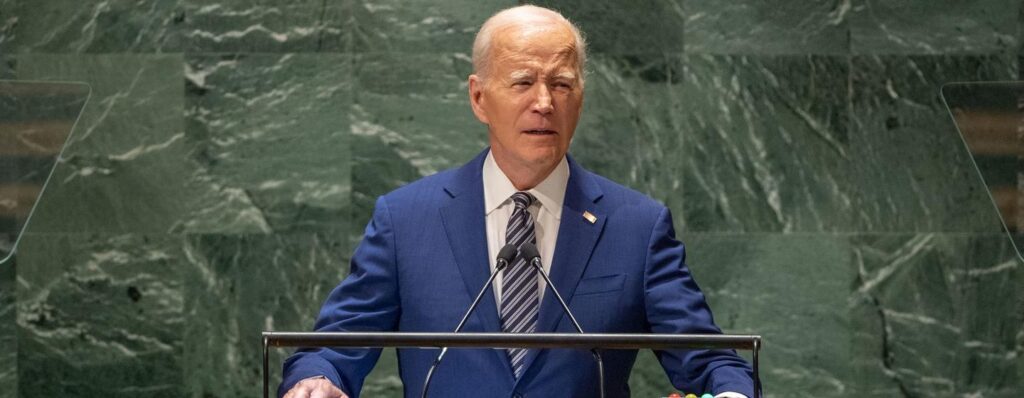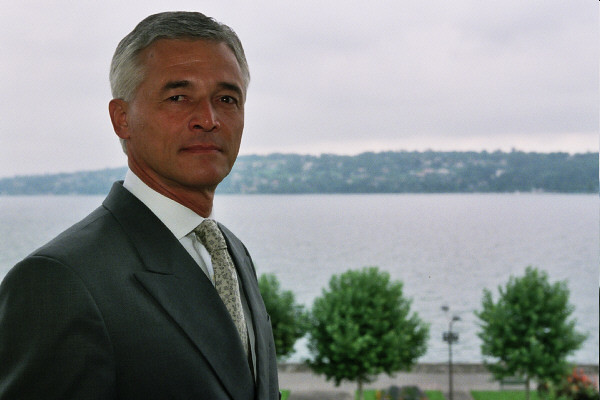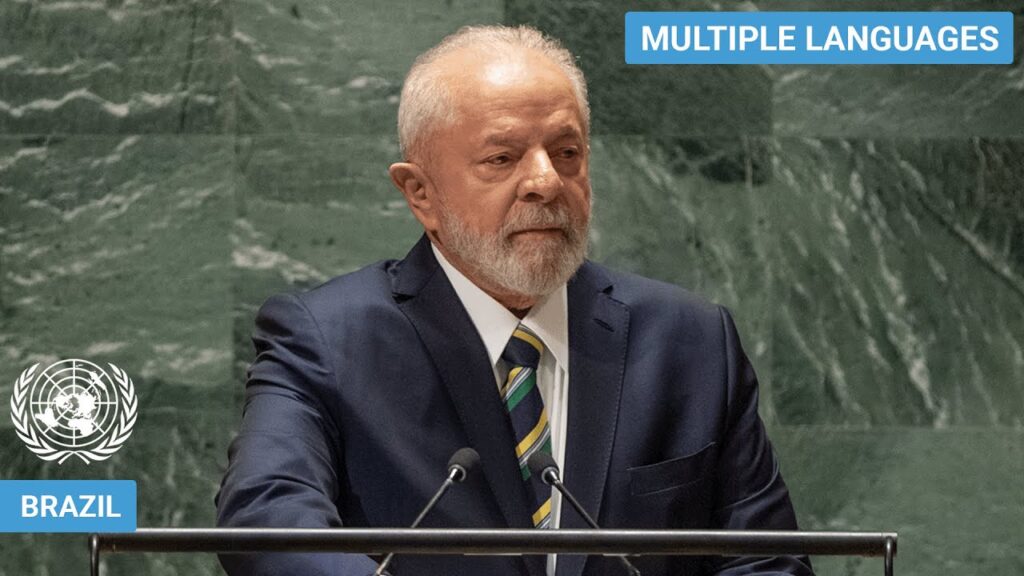Reform or rupture: Amidst the global governance crisis, Brazil and the US address the 78th UNGA

US President Joseph Biden addresses the general debate of the General Assembly’s 78th session (Credit: UN Photo/Cia Pak)
By Rúbia Marcussi Pontes, Patrícia Nogueira Rinaldi, Roberta Silva Machado and Patricia Capelini Borelli* [Informe OPEU]
The General Debate of the 78th session of the United Nations General Assembly (UNGA) started on 19 September 2023 at the United Nations (UN) headquarters in New York. Despite being a crucial session, as it marks the midpoint towards achieving the 17 Goals of the 2030 Agenda for Sustainable Development, the absence of the heads of State and Government of four permanent members of the United Nations Security Council (UNSC) — China, France, the Russian Federation, and the United Kingdom — demonstrates the lack of interest of the great powers in presenting their highest-level agendas and commitments to strengthen global governance in the most significant existing multilateral forum.
António Guterres: “reform or rupture”
The absence of the four powers did not prevent the UN Secretary-General, António Guterres, from opening the session with one of the most emphatic statements he had delivered in the six years of serving as the organization’s chief administrative officer. Guterres stated that it is time to reform and modernize international institutions or face the rupture of multilateralism and human existence, which are threatened more than ever by conflicts and climate chaos.
In his second term serving as the UN Secretary-General, and without the political pressure of seeking reelection, Guterres presented the two pillars of the political legacy he aims to leave for the organization. Firstly, consolidate its Climate Solidarity Pact to accelerate the ambition of developed countries’ targets related to greenhouse gas emission mitigation and ensure a more significant commitment to financing climate adaptation in developing countries.
Secondly, to promote his New Agenda for Peace, which aims to reform the architecture of international peace and security in five priority areas: to prevent geopolitical and nuclear risks; to link the peace and development agendas to prevent the escalation of violence; to strengthen peace missions and seek legitimate paths in peace enforcement situations; to deal with security problems related to the advancement of technology, such as conflicts in outer space and cyberspace; and to strengthen the governance of international collective security.
Brazil in the spotlight
Like Guterres, President Luiz Inácio Lula da Silva took advantage of the tradition of being the first country to address the General Assembly to deliver a powerful statement. He reinforced the slogan that accompanied his foreign policy speeches since his electoral victory: “Brazil is back,” said Lula, praising the role of democracy in overcoming oppression, hate, and misinformation.

Sergio Vieira de Mello | (UN Photo/Patrick Bertshmann) | Flickr
Lula began his statement by remembering Sérgio Vieira de Mello, a Brazilian and UN officer killed in an attack in Baghdad in 2003. He expressed condolences to the victims of the tragedies in Morocco, Lebanon, and Rio Grande do Sul. This expression of national and international solidarity indicated, from the start, that his speech would rescue the traditional lines of the Brazilian foreign policy, putting behind the statements made by Brazil in the last Opening Plenary sessions of the UNGA.
The President combined the classic principles of Brazilian diplomacy with the issue of inequality, which was the structuring axis of his address: Lula mentioned the word 14 times in his statement. By emphasizing the urgency of reducing social disparities and overcoming the problem of hunger, Lula showed, once again, that he was bringing the traditional Brazilian foreign policy agenda back to the UN. The President made it clear when they declared the return of universalism as a guideline and the importance of multilateralism in facing current challenges, especially the climate crisis.
When addressing the climate crisis, Lula also rescued a traditional Brazilian foreign policy stance by denouncing international inequality between developed and developing countries, as these groups contribute to and are affected in different ways by global warming. In this context, he reaffirmed Principle 7 of the Rio Declaration (1992), “common but differentiated responsibilities,” as the pillar for tackling the climate crisis.
Furthermore, Lula reinforced that the world is failing to achieve the 17 Sustainable Development Goals (SDGs) in 2030. He highlighted some measures Brazil has been taking in this regard, especially in the fight against hunger, food insecurity, and reducing poverty and gender inequality. In addition, he announced that achieving racial equality will be the 18th SDG voluntarily implemented by the country.
In the General Assembly chamber, Lula was interrupted several times by applause, and the repercussion of his statement in the national and international media was highly positive. However, his eighth time addressing the UNGA – which made him the leader who took the floor most times in the history of the General Debates – could have been more faithful to the historical moment he represented. Even though Lula’s statement brings some hope by rescuing traditional Brazilian foreign policy, it also generates discomfort for the same reason.
Brazilian foreign policy: It is necessary to go the extra mile
Brazil’s speech resumed important foreign policy guidelines regarding its human rights agenda, such as gender equality, combating violence against women, combating racism, xenophobia, and intolerance, and promoting the rights of LGBTQIA+ people and people with disabilities. In this sense, inequality was presented as the root of current global problems, such as racism, intolerance, and xenophobia.
Another theme highlighted in Brazil’s address was the promotion of gender equality, emphasizing the importance of equal pay and the fight against femicide and violence against women. The theme of women’s rights and gender equality was, however, little explored in President Lula’s statement if we take into account the last four years, in which the Bolsonaro administration articulated initiatives to bring a conservative agenda to the UN. Former President Bolsonaro aligned himself with countries that violate women’s rights and promoted setbacks in guaranteeing these rights at the domestic level.
The rights of LGBTQIA+ people and people with disabilities were mentioned in President Lula’s speech, but timidly. Just like the gender agenda, the rights of LGBTQIA+ people suffered enormous setbacks during the Bolsonaro government, leading to the mobilization of national civil society and, as a result, to the election of two LGBTQIA+ parliamentarians to the Chamber of Deputies. In line with President Lula’s criticism of the advancement of the far-right worldwide, in which the persecution of LGBTQIA+ people and the denial of their rights have become commonplace, Brazil could have explored this topic further in its speech.
At the same time, Lula needled the Global North, such as the US and the European Union, when he defended press freedom and Julian Assange’s liberty and criticized the growing anti-immigration speeches in these countries.
 President Luiz Inácio Lula da Silva of Brazil addresses the general debate of the UN General Assembly’s 78th session (Credit: UN Photo/Cia Pak)
President Luiz Inácio Lula da Silva of Brazil addresses the general debate of the UN General Assembly’s 78th session (Credit: UN Photo/Cia Pak)
The climate crisis and its relationship with inequalities were the highlights of Brazil’s address, especially the mention of national and regional policies to preserve the Amazon and combat deforestation. In this sense, President Lula stated that “the whole world has always talked about the Amazon. Now, the Amazon is speaking for itself.”
Nevertheless, there was not even a mention of the role of indigenous peoples in combating climate change and guaranteeing their collective rights. After the last four years, in which the most severe human rights violations were committed against Brazilian indigenous peoples, it was essential to highlight this topic in the Brazilian statement.
Furthermore, the fact that Lula’s administration created a Ministry of Indigenous Peoples, headed by an Indigenous representative, is a historic milestone that would be worthy of mention and would reinforce Brazil’s commitment to combating climate change. After all, for the Amazon to “speak for itself,” it is necessary to give indigenous peoples a voice and recognize their ancestral role in preserving the biome.
Finally, considering the results of the Amazon Summit in August and Brazil’s winning bid to host the Conference of the Parties (COP-30) on climate change in 2025 in the Legal Amazon in Belém do Pará, it was expected that Lula would mention concrete commitments besides combating deforestation in the Amazon. Brazil should have led by example and presented a set of more ambitious goals for mitigating and adapting to the climate crisis in the region.
Nothing new on the front?: Biden’s speech
After Lula, it was US President Joe Biden’s turn to take the stage. As anticipated, his speech sought to reaffirm something that international practice seems to contradict: the US remains committed to leading and financing the world order.
His first words echoed the Vietnam War and a group of veterans, composed of Americans and Vietnamese, with whom Biden met the previous week. This reminiscence was to say, “with concerted leadership and careful effort, adversaries can become partners, overwhelming challenges can be resolved, and deep wounds can heal.” Without mentioning, of course, the thousands of Vietnamese killed in the conflict.
But as traditionally in US foreign policy, he intended to recall the country’s historic duty to lead the world at critical moments. In this sense, Biden reinforced the US’s commitment to international institutions, particularly the UN.
Interestingly, in the absence of the heads of State and Government of the other permanent members of the UNSC, Biden made a different speech this year, focusing on the demands of the Global South. With phrases like “We [the US] know that our future is bound to yours” and “We have to bring in more leadership and capability (…), especially from regions that have not always been fully included”, Biden signaled measures for regions that have been neglected by US foreign policy, such as Latin America and Africa. One cannot help but notice that Biden’s positioning signals a reaction to Chinese expansion based on alliances and partnerships with developing countries.
In the same way, the positive signal for UNSC reform, with the expansion of permanent and non-permanent members, echoed a long-standing demand from the Global South. However, genuine US efforts in this regard remain to be seen.
Biden also reinforced how the US “is committed to doing its part to get us back on the right path,” including the critical moment of accelerating the fulfillment of the 2030 Agenda and its 17 SDGs. He also dedicated part of his statement to the climate issue. He reinforced his domestic effort, together with Congress, to quadruple funding for adaptation and mitigation of the effects of climate change, with emphasis on US action in this regard with the Pacific Islands Forum.
Finally, as expected, President Biden recalled that the UN is founded on the principle of sovereignty and that an illegal war in Ukraine is still ongoing. He reinforced that, just as the Russian Federation alone is solely responsible for starting this conflict, it alone can end it immediately.
Biden and Lula meet up
The work on the margins of the UNGA signaled how Brazil has regained prominence on the US foreign policy agenda.
In this sense, Biden met with President Lula on 20 September. The leaders announced the Partnership for Workers’ Rights, an initiative that seeks to promote decent work in a growing context of digitalizing economies and using Artificial Intelligence.
According to Lula, this partnership seeks to reduce inequalities and poverty, “which are of no interest to anyone.” He also stated that the bilateral meeting was the “rebirth of a new era in the relationship between the US and Brazil.” Let us wait to analyze whether this possible new phase will correspond to the urgency and promises made to deal, collectively, with the challenges enumerated before the global audience.
* Rúbia Marcussi Pontes is a Ph.D. student in Political Science at the State University of Campinas (UNICAMP). Professor of International Relations at Faculdades de Campinas (FACAMP) and researcher at INCT-INEU. Contact: rubia.pontes@facamp.com.br.
Patrícia Nogueira Rinaldi holds a Ph.D. in Political Science from the State University of Campinas (UNICAMP). Professor of International Relations at Faculdades de Campinas (FACAMP).Contact: patricia.rinaldi@facamp.com.br.
Roberta Silva Machado holds a Ph.D. in Political Science from the State University of Campinas (UNICAMP) and Law from Universidad de Sevilla. Professor of International Relations at Faculdades de Campinas (FACAMP). Contact: roberta.machado@facamp.com.br.
Patricia Capelini Borelli holds a Ph.D. in International Relations from the San Tiago Dantas Program (UNICAMP/UNESP/PUC-SP). Professor of International Relations at Faculdades de Campinas (FACAMP). Contact: patricia.borelli@facamp.com.br.
** Review and final editing: Tatiana Teixeira. First version received on September 22nd 2023. This article does not necessarily reflect the opinion of OPEU or INCT-INEU.
*** About OPEU, or to contribute articles, contact OPEU editor, Tatiana Teixeira, at email: tatianat19@hotmail.com. Regarding our newsletters, for press service, or other matters, contact Tatiana Carlotti, at email: tcarlotti@gmail.com.
Follow OPEU on Instagram, Twitter, Linkedin and Facebook and follow our daily posts.
Comment, share, send suggestions, be part of our community.
We are a research observatory on the USA, with free, non-profit, weekly content.





















